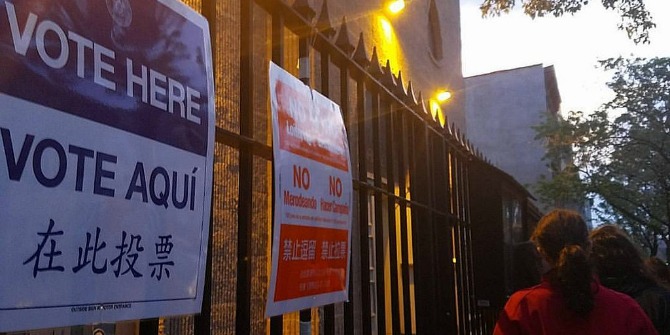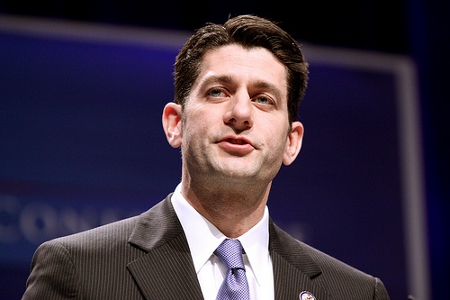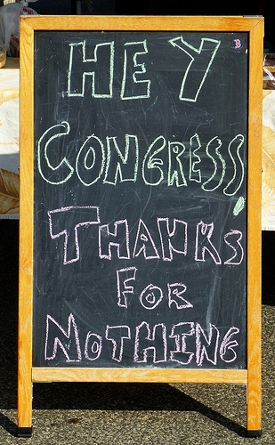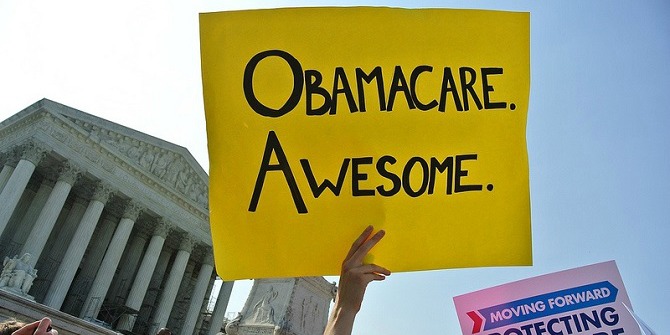USAPP Managing Editor, Chris Gilson looks at the best in political blogging from around the Beltway.
Jump to
[one_half last=”no”]
The 2016 campaign and the New York Primary
The Democratic Campaign and the Candidates
The Republican Campaign and the Candidates
The Beltway and the Supreme Court
[/one_half][one_half last=”yes”]
Foreign policy, defense and trade
Obamacare and health policy
The economy and society
[/one_half]
The 2016 Campaign and the New York Primary
On Saturday, American Thinker looks at the election dynamics between the Democratic and Republican frontrunners, former Secretary of State Hillary Clinton and New York billionaire Donald Trump. They comment that while Clinton has a fairly firm floor (and fixed ceiling) of support, Trump has a fluid floor and ceiling, leading to a great deal of uncertainty as how he might perform as the GOP’s presidential nominee. FiveThirtyEight writes this week that, despite what some might think, Donald Trump does not have the monopoly on intolerant supporters; Clinton and Sanders’ supporters can be just as intolerant as well. Still on the subject of who might vote for whom, The Daily Signal says that only 2 million voters in seven battleground counties will actually decide who the next president will be.
Daily Kos asks this week – are our election seasons too long? It’s been 13 months since Texas Senator Ted Cruz announced that he was running for the presidency – compare this to the UK’s four month election period, and Japan’s 12 days. They argue that it might make more sense to have one single primary two months before the general election. On similar lines, The Atlantic writes on what they term is the ‘never-ending primary’, with both frontrunners unlikely to completely beat their opposition until June or potentially beyond. American Thinker defends the primary system, commenting that if sequential primaries and caucuses are eliminated, then the only way to win will be via establishment money and infrastructure. On Monday, Hit & Run makes the case for contested conventions, arguing that ‘unscripted disagreement’ might inject some substance into the proceedings.
Speaking of Ted Cruz, Crooks & Liars wants him to win the GOP nomination, and then to lose the general election, commenting that conservatives would finally not be able to blame the candidate for not being far enough to the right. Taking the other side, American Thinker reckons that Hillary Clinton is far more beatable by a Republican that she seems to be; she’s now at her lowest rating among Democrats since the campaign started. Townhall agrees, writing that she has won fewer popular votes than she did in 2008.
Could Facebook tilt the election result this year? The Atlantic thinks so. Writing, Monday, they say that the company could slowly remove pro-Trump stories from its news feed, thus pushing voters away from the candidate, or that they could institute an ‘I voted’ button among selected voters, which would encourage turnout.
Townhalli argues this week that the US is in need of an ‘economic-wartime’ president, and signals out Donald Trump as being most likely to be the best candidate for this role.
On Friday, RedState comments that a third party already exists in the US – and Donald Trump is leading it.
Moving on to this year’s down ballot races, Smart Politics wonders if there will still be 20 women in the US Senate in 2017. They comment that two of the six Senators who are set to retire at the end of the current Congress are women, and three more seats held by women are up for election.
Sick of the 2016 election season yet? The Federalist has ten ways to distract yourself.
New York’s Primary

This week the Empire State held its presidential primary. Ahead of the election, Outside the Beltway writes that given the polls, Hillary Clinton and Donald Trump look well-positioned for big wins (Townhall reckons that ‘New York exceptionalism’ explains Trump’s popularity there). There was also some commentary over New York’s voting process: FiveThirtyEight says that it’s harder to change parties there than in any other state and TPM says that the state has introduced none of the reforms of the past two decades which are designed to make voting easier.
Trump did indeed romp home in New York (Daily Kos), as did Clinton (The Atlantic). PoliticusUSA says that Trump’s New York victory speech was ‘completely insane’, while Hit & Run wonders if Clinton’s win means the end for Bernie Sanders’ campaign. It may well be – Americablog reports that New York exit polls show that Sander was only able to win the support of white men.
The Democratic Campaign and the Candidates
On Saturday, Powerline ponders why Democrats seem to hate their own presidents, after seeing that Hillary Clinton has had to repudiate her husband, Bill Clinton’s presidential legacy. The American Interest meanwhile argues this week that it’s the Democrats – not Republicans – who have moved on immigration. Compared to 10 years ago, Democrats are nearly twice as likely to say that immigrants strengthen the country. PoliticusUSA also talks ideology, writing that ideological purity is un-Democratic. They comment that people can be Democrats if they want to break up the banks or not, support single payer healthcare or not, or are socialists, or not.
Many on the Democratic side have been concerned that the party’s primary process is unfair. Monkey Cage says that Bernie Sanders shares this view, arguing that states which are not competitive at the general election have too much of a voice in selecting the party’s nominee. They comment that there are no right or wrong answers, but that Sanders has benefited from winning in some of these states. Political Animal meanwhile wonders if the party will be able to overcome the tribalism of the primary which is pitting Sanders’ supporters against Clintons.
Looking at campaign cash, Daily Kos reports that in March, Sanders both raised and spent the most, ($46 to $45.7 million), while Clinton spent more than she’s raised, but still has $29 million cash on hand.
Moving on to what the two candidates have been up to this past week:
Hillary Clinton
- Clinton’s defense for taking millions from Wall Street? Obama did it too (Townhall)
- Ten questions about abortion that Clinton won’t answer (The Federalist)
- How Clinton wants to break the GOP’s hold on the South – starting with Georgia (PoliticusUSA)
- Why Bernie Sanders’ supporters might love President Hillary Clinton (The American Prospect)
- Was Clinton pandering to black voters last week when she commented that she always carries around hot sauce with her? (The Atlantic)
- Clinton’s win in New York this week put her on the way to the Democratic nomination (Political Animal)
- Give that it was mostly for down ballot Democrats, Clinton’s ‘lavish’ Hollywood fundraiser last week was smart politics (Monkey Cage)
- Despite the Sanders’ campaign lawsuit, Clinton’s joint fundraising agreement with the Democratic National Committee is legal – but it’s also problematic (The American Prospect)
- Clinton is concerned about the number of guns in Americans’ homes (White House Dossier)
- John Podesta, Clinton’s campaign chairman this week hinted that women are being considered as potential running mates – could this mean Clinton/Warren ’16? (PoliticusUSA)
- Could a Hillary Clinton presidency doom the Democratic Party? (Powerline)
Bernie Sanders
- The Vermont Senator met with Pope Francis this week at the Vatican, a meeting which the pontiff stated was not a political one (PoliticusUSA)
- According to his 2014 tax return, Sanders only paid 13.5 percent income tax (The Lonely Conservative)
- How Sanders is banking on winning California to deliver him the Democratic nomination (PolitucusUSA)
-

Senator Bernie Sanders Credit: Senate Democrats (Flickr, CC-BY-2.0) With his comments criticising Israel, is Sanders burning his bridges? (American Thinker)
- It turns out a large number of Americans actually agree with Sanders on Israel (Monkey Cage)
- Sanders does better with independents because of their dislike for partisan politics (FiveThirtyEight)
- It turns out that Sanders doesn’t actually win when Democratic turnout is high (PoliticusUSA)
- Are more Democrats ‘feeling the Bern’ as national polls suggest? Probably (FiveThirtyEight)
- Sanders’ rhetoric suggests that he does not care about the Democratic Party (Caffeinated Politics)
- How Sanders’ decision to move last week’s debate from Pennsylvania to New York backfired on him (PoliticusUSA)
- After his New York Primary loss, the Sanders campaign will “sit back and assess” where it is (The Atlantic)
- Though given that Clinton stayed in the race until the end in 2008, Sanders can do the same this time around (PoliticusUSA)
- If and when Sanders does drop out of the race for the White House, then he needs to work to persuade his supporters to come over to Hillary Clinton (Caffeinated Politics)
- That may be already happening – at least to an extent – as Sanders has been toning down his criticisms of Clinton over the last few days (PoliticusUSA)
- Democrats have apparently become more liberal since 2008 – though not liberal enough to nominate Bernie Sanders (FiveThirtyEight)
The Republican Campaign and the Candidates
On Monday, RedState writes that Trump isn’t the biggest loser in the delegate game; that title goes to Ohio Governor, John Kasich, who seems to have failed at convincing GOP delegates to support him. American Thinker this week wonders if the GOP primary process is rigged, given Trump’s complaint about the process. They conclude that it’s simply the ‘rules of the game’, and that if Trump doesn’t like it, he can start his own party. Hit & Run comments that after Trump’s big win in New York this week, the GOP Primary is about to get very weird.

Daily Kos says that a rules fight over the July convention in Cleveland is sparking a civil war within the Republican National Committee. Later, they say that the GOP House Speaker, Paul Ryan (WI), has urged Republicans to go to the convention, even if it will be a difficult one.
Many have expressed concern that Donald Trump’s candidacy is destroying the Republican Party as we know it. Townhall argues that decadence, not Trump is what is harming the party. They say that the neo-conservative establishment wing of the party, as represented by former Florida Governor Jeb Bush and John Kasich are simply clueless about the economic and cultural forces which are transforming the country.
Moving to the Republican Party’s downticket races this year, Daily Kos says that the party’s flagging fundraising may well hurt them in November.
Turning now to the GOP’s candidates, and beginning with The Donald:
Donald Trump
- The Trump campaign managed to humiliate itself in Georgia this week with its lack of understanding over how the state’s GOP selects its convention delegates (RedState)
- Why is Trump such a loser when it comes to these delegate fights? (Townhall)
- Trump is now hastily trying to ‘buy’ some delegates in Nevada (RedState)
- Is Trump now looking for a way out of the presidential race? (RedState)
- Looking for a way out or not, Trump has been shaking up his campaign in a major way (The Atlantic)
- Speaking of Trump’s staff, some of them might just find themselves in the slammer next year after $3 million in charitable contributions from the campaign to veterans’ group has gone missing (RedState)
- It turns out that a senior Trump policy adviser has previously written columns calling out multiculturalism and segregation (FreakOutNation)
- It turns out that Donald Trump has been flying the friendly skies illegally (RedState)
-

Image credit: DonkeyHotey (Flickr, CC-BY-SA-2.0) Did Donald Trump pay off New York Governor Andrew Cuomo to ignore the former’s fraudulent university? (RedState)
- Trump made a huge gaffe – even for him – this week, referring to the ‘heroes of 7/11’ at a rally in New York (Crooks & Liars)
- The 7/11 gaffe is certainly not a first – here’s a primer for the many scandals of Donald Trump (The Atlantic)
- You can now add retweeting a white supremacist to the above list of gaffes (The American Prospect)
- Despite his gaffe, New York was a big win for Trump, and the ‘Acela primary’ on Tuesday will be even better for him. But we shouldn’t despair (RedState)
- Some argue that even counting the win in New York, it was still a bad week for Trump (Townhall)
- How progressives can constructively engage with Trump’s supporters (Occasional Planet)
- MSNBC has dumped Trump, giving him the least amount of airtime of any of the GOP candidates over the past month (PoliticusUSA)
- Trump wants to change the Republican Party’s stance on abortion to allow it in cases of rape, incest, or when a pregnant woman’s life is at risk (Hit & Run)
- He’s also been making the case for more tolerance towards accommodations for the transgendered (The Atlantic)
- Though claiming Reagan’s mantle in the past, Trump trashes ‘Reaganomics’ and has been questioning toe 40th president’s record (American Thinker)
- In supporting low interest rates, Trump is showing that he knows a good deal more than other Republicans (Wonkblog)
- One of Trump’s top advisers this week said that his primary rhetoric has all been an act to project an image as part of an evolving plan (Americablog)
Ted Cruz
- A ‘wonkish’ interview with the Texas Senator this week on the economy proves that he is the only adult in the race (RedState)
- Cruz reckons that states ought to be able to ban interracial marriages if they wish to (Crooks & Liars)
- Five reasons why Cruz is the best choice for president (RedState)
- Despite being a leading cause of previous government shutdowns, Cruz predicted this week that he would have a very productive relationship with Congress if he were to become president (Daily Kos)
-

Ted Cruz Credit: Gage Skidmore (Flickr, CC-BY-SA-2.0) This week US Representative Peter King (R-NY) stated that he would ‘take cyanide’ if Cruz became the GOP’s nominee (RedState)
- New York Senator Elizabeth Warren did some serious calling out of Cruz in a series of tweets this week after the candidate complained about attacks from the media and others, nonexistent family time, and the detrimental effects of campaigning on his health (FreakOutNation)
- Cruz managed to get a Twitter burn of his own out this week – against Donald trump (RedState)
- How Ted Cruz turned into an establishment candidate (Townhall)
- Cruz was the biggest loser in the New York Primary (Daily Kos)…
- …though he was very smart to campaign in a Bronx district with few GOP voters (Monkey Cage)
- The New York Primary didn’t matter, Cruz is on his way to becoming the nominee (RedState)
John Kasich
- Why the Ohio Governor is a better candidate than Donald Trump (RedState)
The Beltway and the Supreme Court
This week saw the US Treasury announce that it would put Harriet Tubman on the front of the new $20 bill in 2020, replacing Andrew Jackson. Wonkblog says that the choice is an ironic one, given how hard Tubman fought the oppressive system of slavery which helped to found the US economy.
Turning to the Supreme Court, Monkey Cage reports on the US vs Texas case now before the Supreme Court. The case, which heard oral arguments this week revolves around the standing of the Lone Star State to sue the federal government over President Obama’s November 2014 executive order to defer the deportation of 4 million undocumented immigrants.

Moving on to Congress, Daily Kos has the news that the House’s Freedom Caucus (made up of a number of conservative lawmakers) have stated that they are open to moving a number of mostly military spending bills forward without passing a budget resolution. They comment that the Freedom Caucus now seem to be allowing the House to do its job, but are reserving the right to halt the budget process whenever they see fit. The Atlantic meanwhile looks ahead to the potential for a post-November ‘zombie Congress’. The write that with gridlock on the rise, Congressional leaders have often used lame duck sessions to move disputed bills, especially on budget matters.
Daily Kos writes that in the Senate this week, GOP Majority Leader Mitch McConnell (KY) has had a taste of his own medicine after Senate Banking Committee Richard Shelby (AL) defied McConnell’s call to advance a nominee to the board of the Export Import Bank. Speaking of obstruction, Monkey Cage argues that if Senate Republicans were to hold hearings for President Obama’s Supreme Court nominee, Merrick Garland, it would actually help them. Looking to the past, they say that such hearings offer a big platform for lawmakers, and would show the GOP’s seriousness.
Foreign policy, defense and trade
This week saw dispute between Saudi Arabia and the US over a law being considered by Congress which would allow citizens to hold the former country responsible for its alleged role in the 9/11 terror attack. Informed Comment reports that Saudi Arabia has threatened to withdraw $750 billion from the US economy if the bill passes. The Atlantic meanwhile reckons that the potential consequences of Saudi retaliation mean that Obama should veto the 9/11 bill, despite its bipartisan support.
American Thinker writes Sunday that the US has paid for NATO to the tune of $30 trillion since it was founded in 1949, 2/3 of the total spending by all of its members in the time it’s been active. They say that the US needs to start ‘throwing some chairs around’ at NATO meetings, otherwise the freeloading of other nations will go on forever.
On Friday, US Secretary of State, John Kerry signed the Framework Convention on Climate Change, which was agreed late last year in Paris. The Daily Signal argues that by not presenting what they say is a climate treaty to the Senate, President Obama is violating the constitution.
President Obama visited the UK this week, and urged the country to remain in the European Union. Crooks & Liars says that Obama stated that the UK would go ‘to the back of the queue’ on trade agreements if it were to leave.
The Daily Signal writes Friday that China has been flexing its military muscles in the South China Sea, but the US is continuing to show its utter lack of resolve, with efforts by the Navy and Pacific Command to respond more assertively being ignored by the Obama administration.
Obamacare and health policy

On Saturday, Daily Kos writes that despite what many on the right have been maintaining, Obamacare’s premiums haven’t been skyrocketing – the increase has been actually been 4 percent over the past year for the 85 percent of Obamacare consumers who get some kind of assistance. Political Animal comments that Obamacare has been able to halt the expansion of the gap in health insurance between rich and poor. They say that a new analysis of the program shows that it has helped some of the most vulnerable citizens. Along the same lines, Wonkblog writes that the real way that Obamacare helps the poor isn’t about their health – it’s about helping them to pay off their collection balances, thus helping their personal finances.
FreakOutNation says Monday that six years after the Affordable Care Act was passed in the Senate, Republicans are still looking for a replacement. They remind us that having voted 61 times to repeal Obamacare, Congressional Republicans have not voted on a replacement once. Writing from the right, Townhall says that Obamacare’s ‘woes’ will have consequences this election year, with the pulling out of health insurance providers likely to help the GOP in their criticisms of the Democrats’ approach to healthcare.
The Atlantic writes Tuesday on when doctors refuse to treat LGBT patients. They say that some states such as Tennessee and Mississippi have passed laws making it legal for physicians to opt out of a procedure that would involve them compromising their conscience.
The economy and society

Monday marked the deadline for Americans to file their taxes; Monkey Cage looks at how the tax system hurts racial minorities. They write that racial minorities are less likely to own their own home, meaning they benefit less from mortgage interest and property tax deductions, and are less likely to be part of employer based health care insurance and pension plans – both of which are subject to tax breaks. The Atlantic meanwhile writes on the history of the fight over making taxation less awful. They say that a new bill in the Senate would allow the Internal Revenue Service to prefill forms, but that the measure has met with opposition from tax-software companies.
On Tuesday, The American Prospect says that recent actions by McDonald’s and Verizon workers are both different examples of how the labor movement – faced with declining union membership – are trying to gain a better deal for workers. Many, however, do not agree with one of the labor movements’ goals – higher wages. The Daily Signal argues this week that the $15 an hour minimum wage recently introduced by New York State and California (and advocated at a federal level by the Democrats) are the highest minimums the world.
Do you think the rent is too damn high? Well, it’s a policy choice, says The American Interest. They write that cities with onerous zoning laws have shown steeper rent increases in the last five years compared with their counterparts which are less regulated.
Why have Americans become so sensitive to harm in recent years? The Atlantic says that it’s all down to ‘concept creep’, where terms like abuse, trauma, and prejudice now encompass far more than they ever did in the past.
Featured image credit: another sergio (Flickr, CC-BY-NC-SA-2.0)
Please read our comments policy before commenting.
Note: This article gives the views of the author, and not the position of USAPP– American Politics and Policy, nor of the London School of Economics.
Shortened URL for this post: http://bit.ly/26lF1K2





